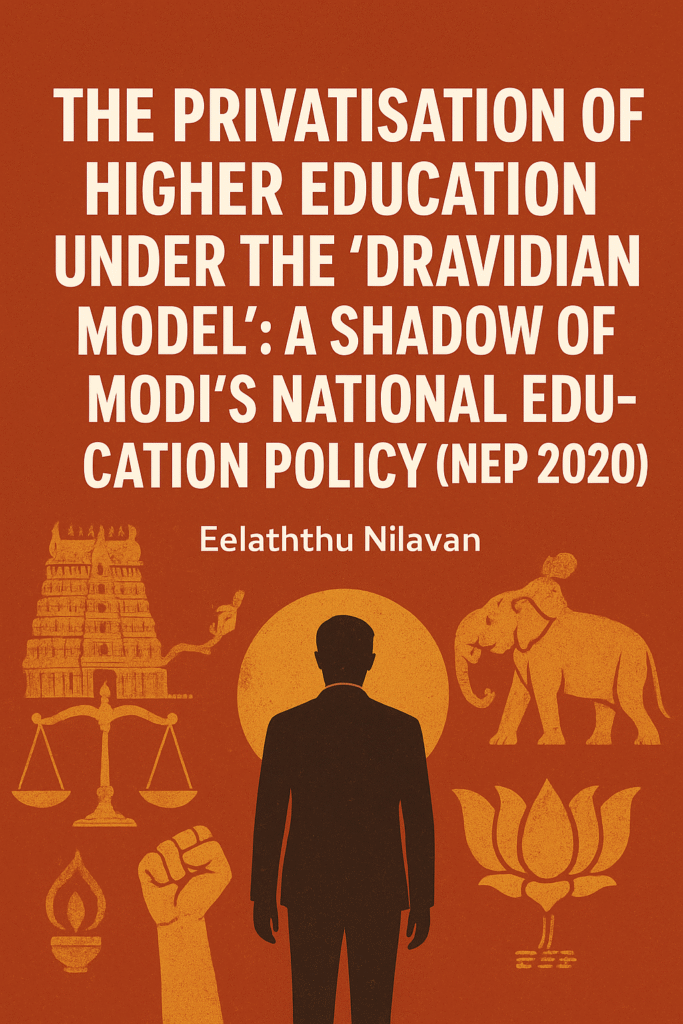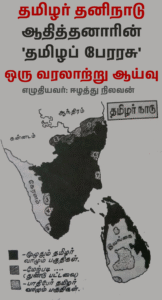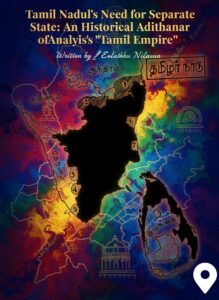The recent amendment to the Private Universities Act, which aims to privatize higher education, reinforces the argument that the current Tamil Nadu government, operating under the ‘Dravidian Model,’ is following the path laid out by the Central government’s National Education Policy (NEP 2020)—a policy it outwardly claims to oppose. The introduction of this anti-people legislation, which will hand over higher educational institutions en masse to private hands by an administration that claims to prioritize social justice and state rights, exposes its fundamental policy contradictions.

The Context of the Amendment: A New Chapter in Higher Education Privatization
The debate surrounding the Amendment to the Tamil Nadu Private Universities Act, 2019 (The Tamil Nadu Private Universities Act, 2019 Amendment Bill), tabled by the M.K. Stalin government during the winter session of the Assembly, clarifies that this is not merely an administrative reform. Instead, it is a perilous scheme intended to restructure the architecture of higher education.
Many academicians and opposition parties accuse this Bill of being a literal implementation of the core philosophies of the Central BJP government’s National Education Policy 2020—specifically, the push for privatization under the guise of ‘consolidation ‘of autonomy of Higher Education Institutions (HEIs).
The Peril of ‘Brown Field Universities’
Central to this amending act is the introduction of a new category: ‘Brown Field Universities.’ This provision allows existing government-aided colleges to be converted into private universities.
Government-aided colleges have historically been instrumental in upholding:
➊ Social Justice Policy: They were mandatory followers of Tamil Nadu’s 69% reservation policy.
➋ Affordable Education: They charged minimal fees from students.
➌ Job Security: Professors received government pay scales and service security.
➍ Public Assets: Their infrastructure was built using government funds and UGC grants.
By introducing this disastrous scheme to hand over these colleges to private entities as Brown Field Universities, the government is essentially withdrawing from higher education and surrendering the Tamil society’s educational assets to private commercial interests. The Association of University Teachers (AUT-TN) and the Joint Action Council of College Teachers (JACCT) have strongly condemned the move, warning that it will compromise reservation policies and destroy the job security of teachers.
Relaxing Land Norms: Accelerating Privatization
The amendment’s provision to reduce the land requirement for establishing private universities is seen as a tactic to accelerate and expand privatization. The previous requirement of 100 acres of contiguous land for a private university has been drastically relaxed: 25 acres in Municipal Corporation areas, 35 acres in Municipal/Town Panchayat areas, and 50 acres in rural areas.
These relaxations aim to facilitate the upgrade of existing private self-financing colleges into universities, even with limited land. The primary consequence will be an exponential increase in the number of private universities across the state, thereby accelerating the commercialization of higher education.
The Erosion of Social Justice
The conversion of colleges into private universities fundamentally alters their legal structure, thereby undermining the basis of social justice:
❶ Abolition of Reservation: The amendment effectively creates a loophole where private universities offering Arts, Science, and Engineering courses will not be obliged to follow the state’s 69% reservation policy strictly. Although non-minority universities must reserve 65% of seats in medical-related courses for the government quota, there will be no room for social justice in management quota seats and other disciplines.
❷ Exorbitant Fees: With reduced government control over financial administration, the fee structure is likely to skyrocket, crushing the aspirations of poor and marginalized students. Furthermore, while the state already employs a large number of ‘Guest Lecturers’ in existing aided colleges with meager salaries, the conversion to private university status will likely lead to a situation where no one enjoys statutory remuneration, ultimately degrading the academic environment.
The ‘Dravidian Model’ Implementing the NEP 2020 Agenda
While the Dravidian Model government publicly opposes the NEP 2020, its actions tell a different story. The current attempt to privatize government-aided colleges under the ‘Brown Field University’ category is a clear execution of the ‘Type 3 Higher Education Institutions’ concept mentioned in NEP 2020. The NEP 2020 envisions a transition where all affiliated colleges become autonomous and eventually evolve into unitary universities. The DMK government’s amendment is the first and most critical step towards this structural transformation. This contradictory approach—ostensibly opposing the Modi government’s retrograde education policy while totally implementing its agenda in higher education—repeatedly proves that the ‘Dravidian Model’ is merely the Tamil Nadu version of the ‘Modi Model.’
Conclusion: A Challenge to Tamil Nadu’s Educational Landscape
The rhetoric of a ‘Best in Education Tamil Nadu‘ stands in stark contrast to the reality of the administration’s policy, which seeks to collectively hand over higher education to private interests, sacrificing social justice, the job security of professors, and the future of underprivileged students. This is the true face of the ‘Dravidian Model.’
By choking government and historical universities with financial constraints, the government is paving the way for the next stage of this staged execution: the complete transfer of control to the private sector. This act threatens to become a model that will ruin Tamil Nadu’s education system.
Therefore, this is not a concern for academics and students alone. It must be seen as a total struggle revolving around social justice, reservation, employment, and state policy. It is imperative that all opposition parties in the Assembly, along with the youth and the general public of Tamil Nadu, rise against this Bill. Failure to defeat this Act, which threatens to dismantle the very foundation of the Dravidian movement’s social justice policy, will permanently alter Tamil Nadu’s destiny.

Written by: Eelaththu Nilavan
(Tamil Nationalist Historian, Analyst of Global Politics, Human Rights, Economics, Intelligence, and Military Affairs)
18/10/2025
The views expressed in this article are the author’s own and do not necessarily reflect Amizhthu’s editorial stance.



